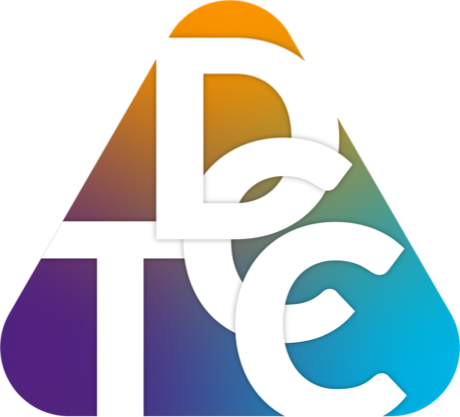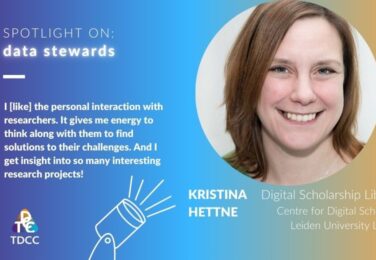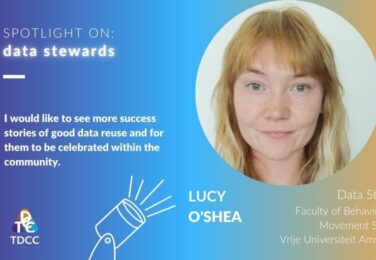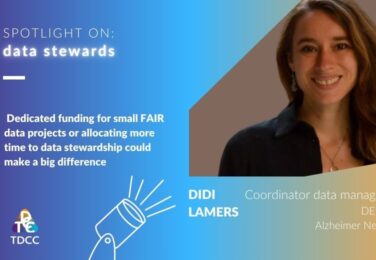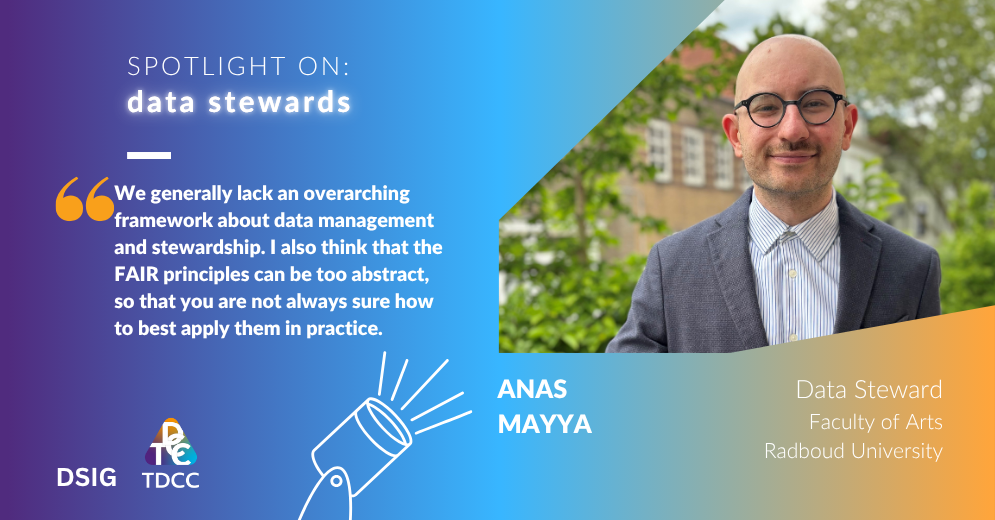
Spotlight on: Anas Mayya
Every other week, the Thematic DCCs and the Data Steward Interest Group (DSIG) put the spotlight on one research data steward working in the Netherlands to stimulate knowledge exchange and peer-to-peer learning.
What drew you towards the research data management field?
I work as a data steward at the Faculty of Arts at Radboud University where I mainly support researchers who work with one form or another of linguistic data in making their data FAIR and complying with the GDPR. What drew me to the role is the fact that I benefited myself greatly from FAIR-compliant databank, known as the TalkBank. Thanks to the rich documentation used, I was able to reuse a dataset to answer my own research questions. This would not have been possible without the efforts put into making the TalkBank accessible and reusable for other researchers. I wanted to help provide to others what was once provided to me.
But more broadly, I find the world of data management to be of great relevance and interest in our day and age. Data can be a valuable resource but when richly described and managed (for example, stored, retained, or destroyed) and used properly. But with little or inaccurate metadata and little coordination between stakeholders, it can become useless or, worse, even dangerous. Think, for example, about accidental data leaks, unauthorized access to or use of data,or important decision being made based on inaccurate data. Furthermore, it takes a lot of people, perspectives, expertise and collaboration to ensure that we reap the benefits of the data and minimize the costs. I enjoy and see value in the challenges of proper data management.
What is an activity/task of your role that you find yourself looking forward to?
I enjoy thinking along with researchers about their research data lifecycle and helping them prepare accordingly by asking relevant often overlooked questions. It is my experience that one forgets a crucial step that requires considering and integrating into the plan. For example, a researcher wants to link data from two different systems but does not think well about the key/link during data collection.
I also enjoy connecting people with each other or pointing out relevant facts. People in distinct roles usually have different priorities (e.g., GDPR vs Open Science) when it comes to data management and part of my role is to facilitate the process of decision making where multiple perspectives are considered.
What is something unexpected that you can offer help with, if a colleague reaches out to you?
This is not something related to Research Data Management, but for the past 18 months I have been switching gradually to working in Dutch, with considerable success! If an international colleague would like to be able to work in Dutch without compromising their work quality or efficiency, I would be very happy to talk and share a list of tips with them.
Similarly, if a Dutch colleague wants to effectively offer support to an international colleague in language learning in the workplace, I have some ideas and would be happy to talk.
What do you think your community of research data professionals is missing?
This is hard to answer because the research data colleagues I have met come from very diverse backgrounds and could have various sets of expertise. Therefore, which type of knowledge and expertise that is missing could vary vastly across data stewards.
But generally speaking, and because data stewardship is not something you study at university, we generally lack an overarching framework about data management and stewardship. I also think that the FAIR principles can be too abstract, so that you are not always sure how to best apply them in practice.
I also think some data stewards, including myself, could benefit from training about copyrights especially in the context of reusing existing (personal) data in archives, newspapers, or other media platforms. Another knowledge gap is legislation around AI.
What is a topic you would want to collaborate on with others?
I believe in starting small and learning from the process.
I would like to increase internal use of research data within my faculty. I think by doing so one can refine one's knowledge about the FAIR principles and can also showcase its value to the researchers they work with. I would be very interested to exchange experiences and ideas with data steward(s) who plan to do this at their organization..
Could you point us to a resource, learning platform, tool or similar which you find useful or inspirational?
I find the book on Data Managing Body of Knowledge (DAMA BOK) to be an essential reference for every data management professional, although it was not mainly written with research data in mind and it can be dry if read alone without consulting other sources. Some chapters of the book resonated with many situations I encountered in my role. Had I read the first chapter before I started my role, I would have approached tasks quite differently.
Moreover, data stewardship can be a form of knowledge organization. And who is better to learn from about this area other than librarians and information scientists? I think exploring themes and methods in these fields could help data stewards actualize the FAIR principles.
Finally, I find the course on Knowledge Graph by Harold Sack and Mehwish Alam to be a good introduction into the Resource Description Framework (RDF), (meta)data interoperability, and the semantic web. These interrelated concepts, in my opinion, are useful for understanding the FAIR principles.
Get in touch with Anas on LinkedIn
Do you want to read other interviews published in the Spotlight on series? Visit the series' page.
Are you a data steward or data professional who wants to be featured in one of the future editions? Fill out this form.
